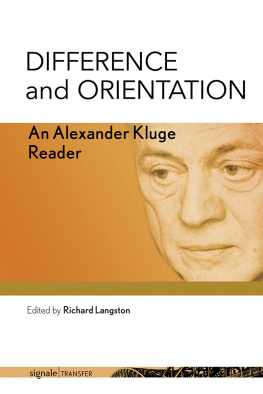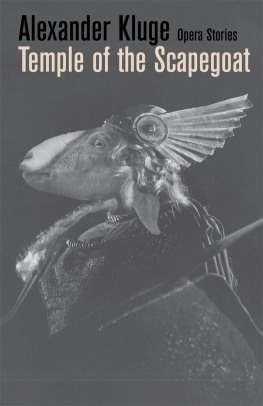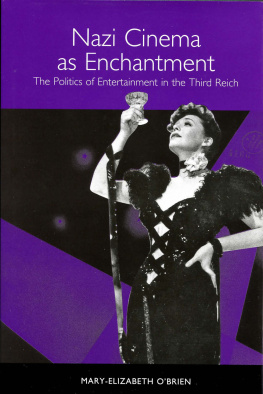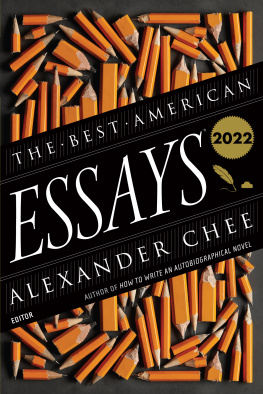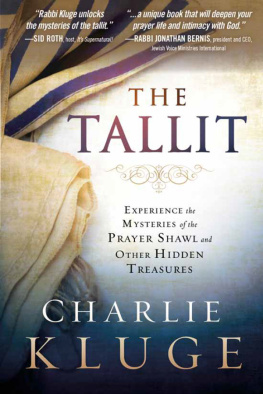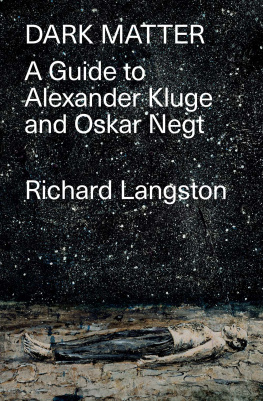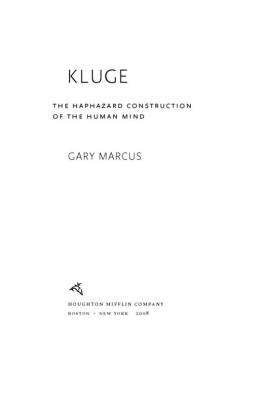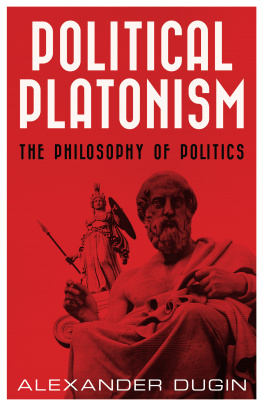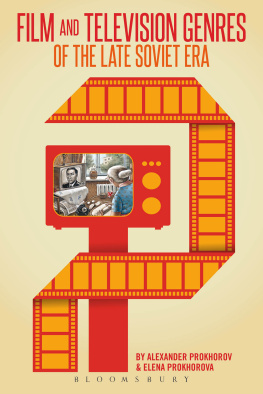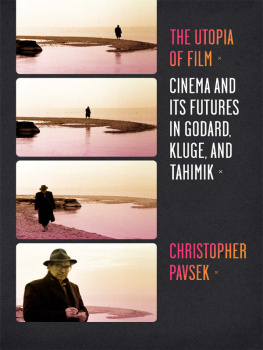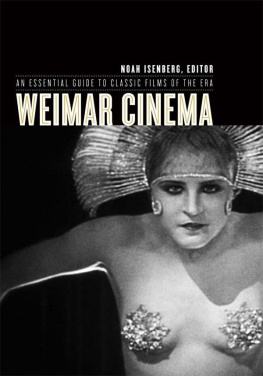ACKNOWLEDGMENTS
I traveled to Munich in the summer of 2010 with the intention of paying Alexander Kluge a visit and floating the idea of an English-language reader of newly translated essays. Difference and Orientation is just one of many collaborations and projects that resulted from that initial conversation. Foremost among these were my involvement as principal translator of Kluge and his longtime collaborator Oskar Negts magnum opus, History and Obstinacy (Zone Books, 2014); my editorial oversight of the second volume of the Alexander Kluge-Jahrbuch entitled Glass Shards (Vandenhoeck & Ruprecht, 2015); and my forthcoming monograph, Dark Matter: A Guide to Alexander Kluge and Oskar Negt (Verso, 2020). The last of these projects to come to fruition, Difference and Orientation profited from a wealth of experience and acquired knowledge initially made possible by a research leave supported by the Alexander von Humboldt Foundation. Like everything before it, this anthology would have been impossible without Kluges long-standing support, for which I am endlessly grateful. Beate Wiggen and Glsen Dhr at Kluges DCTP offices in Dsseldorf have also been invaluable interlocutors. Initial work on the translations contained in these pages began in the fall of 2011 and concluded in the fall of 2017. Of the many translators involved in rendering Kluges thought into English, the esteemed British team Martin Brady and Helen Hughes as well as Samantha Lankford deserve special recognition for joining the original team after the project set sail and making their work available. Responsible for the lions share of these translations, Emma Woelk was a key collaborator who constantly went beyond the call of duty. Bethany Wasik of Cornell University Press was instrumental, especially in securing rights to reproduce the only two previously published translations included in Difference and Orientation. I am indebted to Miriam Hansens estate for allowing me and Cornell University Press to include her and Sally Poors seminal translations. Kizer Walker of Cornell University Library and the Signale series was a crucial advocate early on; without his enthusiasm and support, this anthology would have never gotten off the ground. Similarly, the editor in chief at Cornell University Press, Mahinder Kingra, championed the idea for this anthology and generously accommodated its considerable scope. Marian Rogerss meticulous editorial work conferred on the manuscript spit and polish, for which I am most appreciative. Above all, Difference and Orientation would have simply never materialized without Leslie Adelsons support. Her advocacy, expertise, advice, and feedback have been the linchpin that ensured that the many essays and dialogues assembled here reach the wide English-language readership they rightfully deserve.
Richard Langston
Durham, North Carolina
THE GUARDIAN OF DIFFERENCE
The Essayist Alexander Kluge
Richard Langston
Born in 1932 in the central German city of Halberstadt, the German polymath Alexander Kluge is certainly known both at home and abroad for wearing many hats. Above all, his career as one of New German Cinemas most cerebral filmmakers still commands international acclaim, even though he officially bid adieu to celluloid with his last feature, Miscellaneous News (1986). First and foremost a writer of stories before he ever shot Brutality in Stone, his first short made together with Peter Schamoni in 1960, Kluge returned to writing in earnest in 2000 with his massive Chronik der Gefhle [Chronicle of Feelings] and has generated since then an astonishing complex corpus of storybooks that has grown more than twice the size of what he published during his first robust literary phase, which was framed by his literary debut, Attendance List for a Funeral (first published in German in 1962 and later republished as Case Studies), and the extensively revised fifth German edition (1978) of his second book, The Battle (the first edition of which was published in
Calling Kluge an essayist may initially strike readers of this anthology as a strange proposition, especially given how a quick scan confirms that roughly half of the texts contained in the following pages look less like what we formally expect of essays and more like run-of-the-mill dialogues. Sorting Kluges massive canon according to medium and then genre would appear to substantiate such doubts. Even though occasional essays by Kluge have appeared in German literary and theory journals (like Merkur, Kursbuch, and sthetik und Kommunikation) as well as in miscellaneous anthologies since the sixties, he has published so few stand-alone volumes of collected essays throughout his sixty-year career that they can be counted on just a few fingers. When thought of in these terms, Kluge How then is it possible to call Kluge an essayist when so much of what we might designate as his own bona fide essayistic output is the result of a defensive strategy or a concession to institutional rituals? Does the essay really belong to Kluges core register of expression? What, for that matter, is to be gained by calling Kluges speeches and dialogues essays? Are his essays limited to just his printed work, or does the term also apply to his films and videos? In other words, where exactly does the essay reside in Kluges oeuvre, and what relationship does it assume to the rest of his work?
What may look dubious from one perspective appears quite obvious from another. Overlooking the status of these aforementioned essay collections entirely, film scholars have had few if any qualms calling Kluge the filmmaker an essayist, especially given how both his celluloid films (196086) and his recent video films, like the nearly ten-hour News from Ideological Antiquity: Marx-Eisenstein-Capital (2008), all conveniently fall under the aegis of the essay film. Hardly limited to just his films, the contrasts and gaps typical of montage are also present, albeit in transposed form, in Kluges literature, television programs, streaming video, and video films. With the explicit inclusion of indexes in his recent books, films on DVD, and online streaming videos, Kluge has in fact upped the ante, insofar as readers and viewers are encouraged now more than ever before to think about relationships that exceed the boundaries of genre and flow across his multiple media.
Difference and Orientation
To call Kluge an essayist is therefore not to speak of a distinct subgenre in his multimedia oeuvre, but rather of a peculiar way his work thinks critically about the real contexts of contemporary life. In his seminal essay The Essay as Form, published three years after he serendipitously met the twenty-four-year old Kluge at a classics lecture held at the Goethe University Frankfurt, Adorno extolled the essay as a hybrid form when most post-war West German academics frowned upon it as something trivial and relativistic. For Adorno, the essays reliance on play and luck, its aversion to methods and systems, as well as its open, fragmentary character, are just some of the many features that made it for him the critical form par excellence. fragmentary forms, regardless of whether they are cinematic (film, video, streaming video) or literary (stories, speeches, dialogues, essays) in nature. Arguably, the most important point is, however, Adornos elucidation of how the essay thinks.
It is not the essayist who thinks but rather the essay itselfAdorno calls it an arena for intellectual experienceand it does so idiosyncratically and in opposition to dominant modes of thought predicated on scientific and philosophical notions of truth.
Both of these manifestations of relationalitydialectical and multidimensional differenceare equally important for Kluges essayistic thinking. The first evokes Adornos account of the essay as a critique of system, but in Kluges hands the locus of this critique shifts in part from the thinking mind to the sensing body.

